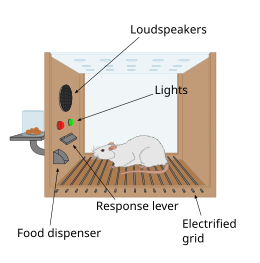
Back تعزيز (علم النفس) Arabic Подкрепление Bulgarian Verstärkung (Psychologie) German Ενίσχυση (ανάλυση συμπεριφοράς) Greek Plifortigo Esperanto Reforzamiento Spanish Sarrus Estonian Errefortzu (psikologia) Basque Renforcement French חיזוק HE

In behavioral psychology, reinforcement refers to consequences that increase the likelihood of an organism's future behavior, typically in the presence of a particular antecedent stimulus.[1] For example, a rat can be trained to push a lever to receive food whenever a light is turned on. In this example, the light is the antecedent stimulus, the lever pushing is the operant behavior, and the food is the reinforcer. Likewise, a student that receives attention and praise when answering a teacher's question will be more likely to answer future questions in class. The teacher's question is the antecedent, the student's response is the behavior, and the praise and attention are the reinforcements.
Consequences that lead to appetitive behavior such as subjective "wanting" and "liking" (desire and pleasure) function as rewards or positive reinforcement.[2] There is also negative reinforcement, which involves taking away an undesirable stimulus. An example of negative reinforcement would be taking an aspirin to relieve a headache.
Reinforcement is an important component of operant conditioning and behavior modification. The concept has been applied in a variety of practical areas, including parenting, coaching, therapy, self-help, education, and management.
- ^ Definition of reinforcement from the American Psychological Association Retrieved on January 30th, 2024
- ^ Schultz W (July 2015). "Neuronal Reward and Decision Signals: From Theories to Data". Physiological Reviews. 95 (3): 853–951. doi:10.1152/physrev.00023.2014. PMC 4491543. PMID 26109341.
Rewards in operant conditioning are positive reinforcers. ... Operant behavior gives a good definition for rewards. Anything that makes an individual come back for more is a positive reinforcer and therefore a reward. Although it provides a good definition, positive reinforcement is only one of several reward functions. ... Rewards are attractive. They are motivating and make us exert an effort. ... Rewards induce approach behavior, also called appetitive or preparatory behavior, and consummatory behavior. ... Thus any stimulus, object, event, activity, or situation that has the potential to make us approach and consume it is by definition a reward. ... Intrinsic rewards are activities that are pleasurable on their own and are undertaken for their own sake, without being the means for getting extrinsic rewards. ... Intrinsic rewards are genuine rewards in their own right, as they induce learning, approach, and pleasure, like perfectioning, playing, and enjoying the piano. Although they can serve to condition higher order rewards, they are not conditioned, higher order rewards, as attaining their reward properties does not require pairing with an unconditioned reward.